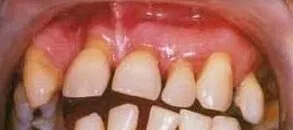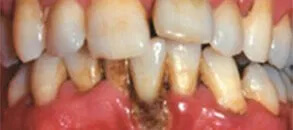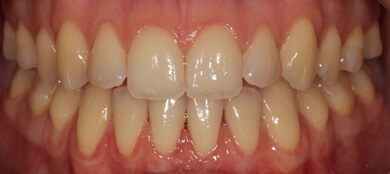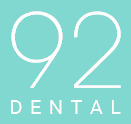What is Gum Disease?
Periodontal (gum) disease is a chronic infection of the gum and bone that hold your teeth in position. It is frequently painless and you may not be aware that you have a problem until the gums and supporting bone are seriously damaged. This is why regular dental check-ups are so important. Almost everyone will have some degree of gum disease at some time in their lives. Gum disease is the most common cause of tooth loss in adults.
Aside from causing tooth loss, there is also a strong link between gum disease and other common diseases such as diabetes, cardiovascular disease (heart disease and stroke) and adverse pregnancy outcomes.
All gum disease is caused by bacterial plaque. This is a film of bacteria that forms on the surface of teeth and gums every day. Effective removal of plaque by brushing and flossing daily will prevent the harmful bacteria in plaque from proliferating and causing gum disease.
Fortunately, if diagnosed early, gum disease can be treated with regular scaling and rigorous oral hygiene. Often your dentist and hygienist alone can manage gum disease, but if the condition worsens you may be advised to see a Periodontist. This is a dentist with special expertise in gum conditions and their management.
Who needs to have Gum Disease Treatment?
A lot of people who have gum disease have no obvious symptoms. This is likely why it is the leading cause of tooth loss in adults. There are, however, certain signs that indicate that you may be developing gum disease. These include:
- Bleeding when brushing teeth
- Bad breath
- Sore and inflamed gums
- Loose teeth and movement of teeth
There are also certain risk factors which contribute to the likelihood of someone developing gum disease. These risk factors include:
- Poor oral hygiene – this is the most common cause of gum disease. Regular visits to the oral hygienist and dentist can help monitor your hygiene and contribute to the prevention of gum disease
- Smoking – gum disease is more common in smokers than non-smokers
- Hereditary – gum disease tends to run in families
- Diseases that reduces how effective the immune system works such as Diabetes and AIDS
- Drugs – as a side effect of certain prescribed drugs
- Age – incidence increases with age
- Stress – this reduces one’s immune systems effectiveness
- Lack of quality sleep- this also reduces the effectiveness of one’s immune system
- Hormonal changes such as pregnancy
Your dentist and hygienist must be aware of any of these symptoms and risk factors that you may have so they can pay the required diligence to your gum health.

GUM DISEASE CAUSING MOVEMENT OF TEETH

GUM DISEASE CAUSING INFLAMED GUMS

HEALTHY GUMS AFTER PERIODONTAL TREATMENT
In healthy teeth, the space (sulcus) between the gum and tooth is less than 3mm deep and can be fairly easily cleaned by flossing and brushing. In Periodontal Disease this groove deepens (to 4 mm or more) to form a pocket that collects more plaque bacteria. These bacteria, which are difficult to remove from the pocket by normal brushing and flossing, produce toxins that lead to the breakdown of the tissue and bone anchoring the teeth. Over time, the pocket deepens and the tooth becomes loose and will eventually fall out.
What happens when I have Gum Disease Treatment at 92 Dental?
Initially, when you see our periodontal expert, you will have all the pockets around your teeth measured with a probe and a full set of X-rays done to assess whether any bone loss has occurred. Based on the findings we will propose a treatment plan that may include extracting any teeth that are beyond saving, and scaling and root planing the remaining teeth. Root planing removes all the plaque and calculus (tartar) from the pockets and root surface. This allows for reattachment of the gum to the healthy bone.
Periodontal disease cannot be ’cured’, but it can be managed with professional help and a real commitment by you to maintain a high standard of oral hygiene.
We will teach you a thorough and effective way to clean your teeth every day. Two months after your initial treatment you will have a review where we look to see if the pockets show signs of healing. You may required to have further treatment for more problematic areas, which we will then discuss.
If everything is healing well, you will be asked to see the hygienist at regular intervals to scale and polish your teeth and check your cleaning regime. This maintenance phase is the most important in ensuring the long-term success of your treatment. We will also ask you to try and eliminate lifestyle-associated risk factors of gum disease, such as smoking. The more diligent you are with maintenance, and the less risk factors that you have, the greater chance you have of a successful outcome with treatment.
